Measuring the hallmarks of ageing – how can you track the underlying causes of ageing?
What consumer tests are available to check your hallmarks of ageing and how they're impacting your body?
Join the club for FREE to access the whole archive and other member benefits.
Spermidine supplements have gained interest in recent years due to their potential health benefits, including anti-aging effects (by inducing autophagy), cardiovascular health, neuroprotection and improved immune function. See Spermidine - the little known, but big hitting anti-ageing supplement for details for the science behind the supplement.
I decided to spermidine a try after Leslie Kenny kindly provided me with a month’s supply, though note that she did not ask for (and did not receive) any editorial oversight of my trial-of-one. Leslie’s company, Oxford Healthspan, produces a high-quality spermidine supplement branded as Primeadine. It claims to be “the cleanest, purest food-derived spermidine supplement on the market” and certainly seems to support that with its sourcing of ingredients, regulated manufacturing (GMP), and oversight from a scientific advisory board that your run-of-the-mill supplement company doesn’t have.
Fortunately for me, as I have coeliacs disease, Primeadine is available in a gluten-free version as well as their original supplement which uses a wheat germ extract.
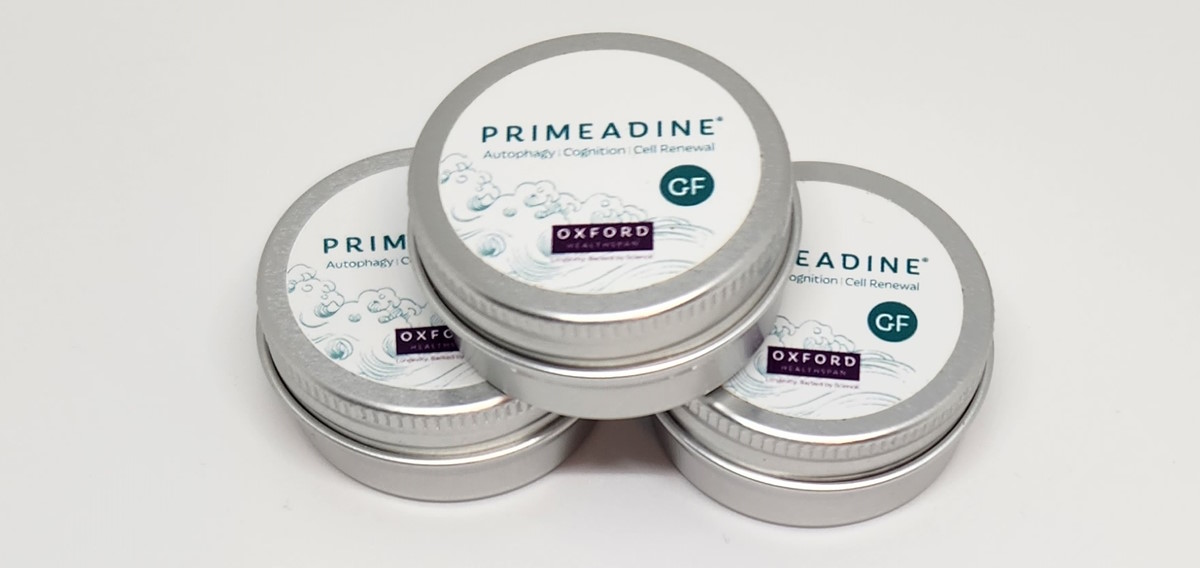
I had 3 small sample tins of Primeadine GF, enough to last 30 days, which I took from 3rd October through to 1st November 2022. As per the instructions (“preferably before 2pm”) I took two tablets each day just after lunch.
The first thing I noticed about the Primeadine supplements was a slight grassy smell when I opened the tin – hopefully a sign of freshness; supplements are generally pretty inert in their container.
The tablets were also quite chunky (and green!) but not oversized. I’m not great swallowing pills (seem to have to try to time swallowing just right) but I didn’t have any problem taking these. And, having noticed the aroma from the tin, there wasn’t actually any noticeable flavour when placed on my tongue, with any a subtle one appearing when I rolled it around to taste them.
If you really want to taste them, the directions say you can also chew the tablets or, alternatively, grind them up as an ingredient in a smoothie.
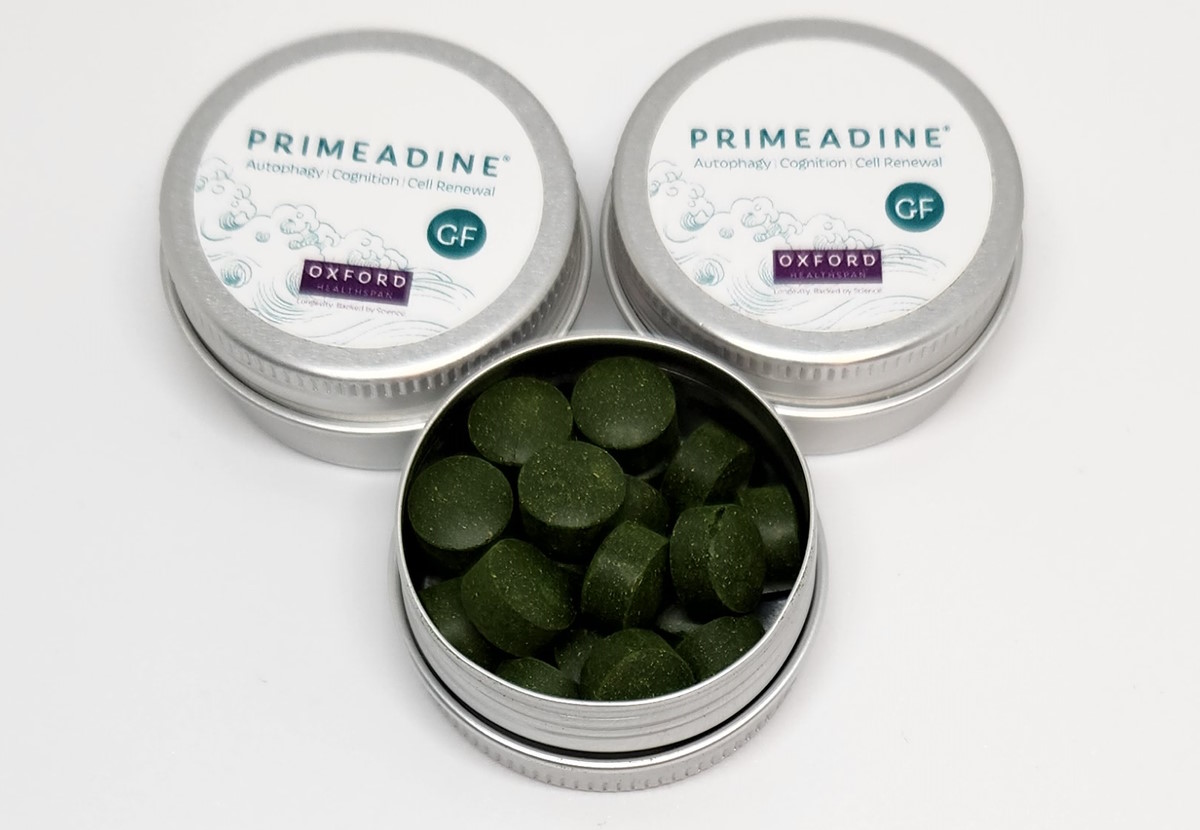
I didn’t have time to do a full trial, with before and after blood and biological age tests, but did track some physical biomarkers in case there were any dramatic changes – I’m particularly careful to monitor blood pressure in case that is adversely affected.
One thing to note, which could skew the results a little, is that I started the trial on the tail end of a cold, nothing serious but I still had a blocked nose and a cough for the first few days.
Leslie had told me that many people report improved sleep, almost from day one, taking spermidine. This is a difficult area for me to see improvement as, unless really busy, I’m generally able to get to sleep within 10-15 minutes and have a good night’s slumber.
It’s hard to measure without a sleep tracker (my Circular ring is on order) but I think I did get off to sleep a little quicker, or at least my mind seemed to clearer faster than normal when my head hit the pillow.
One of the most important, and easiest, physical biomarkers to track, I take my blood pressure measurement once to twice a month, and more regularly when testing a supplement just in case it changes dramatically (which I did once when I overloaded on iron).
The graph below shows the 30 day trial with 1 month before and after. FYI my 1-year pre-trial average was 107/64 with a pulse of 54.
It does look like my BP was lowered slightly (both systolic and diastolic) during the spermidine trial. There is some random variation before and after the supplementing period, but it’s clear that there was no adverse increate to my blood pressure during that time.
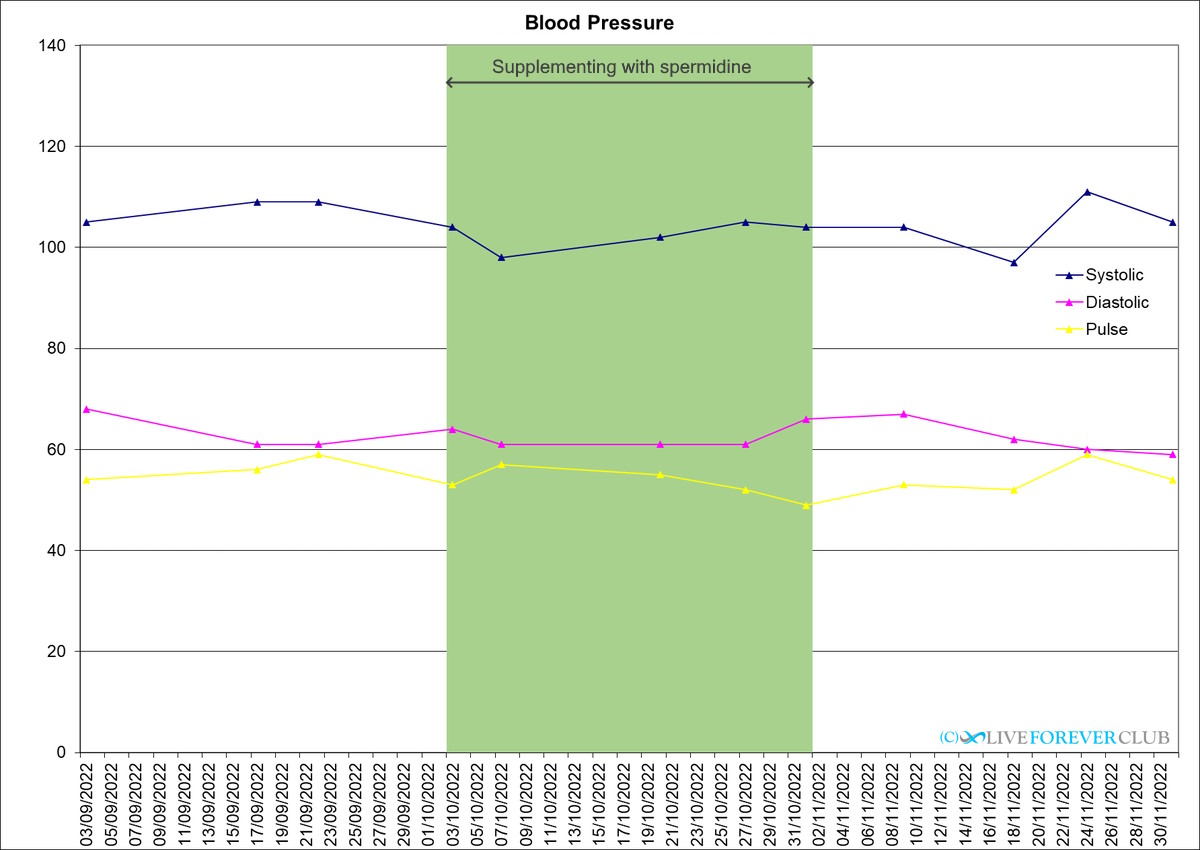
SpO2, or peripheral capillary oxygen saturation, is a non-invasive way to estimate the oxygen levels in the blood, providing insight into your respiratory and cardiovascular health, and therefore is a useful biomarker to track as it can serve as an early warning sign of health problems.
Mine is generally disappointingly low, with a 1-year pre-trial average of 97%, but often dips down to 95% which is on the edge of the normal range.
Four out of five measurements during the trial were 98%, so I’d say that was a success.
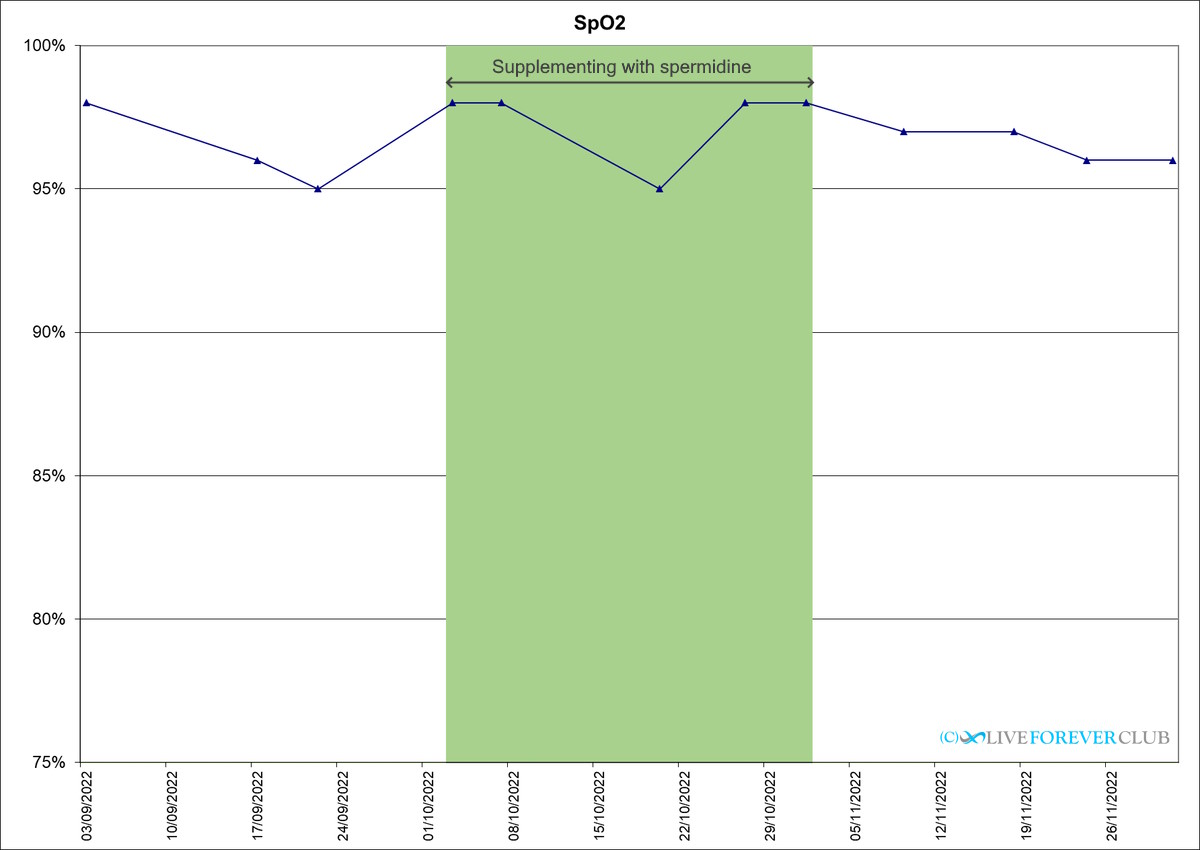
My weight is very stable at 70 kg, plus or minus a pound (yes, I like to mix my units!) and it stayed within that range throughout the trial. There is a trend upwards but probably not significant.
However, my body fat percentage varies a lot more, I assume due to inaccuracy of the bathroom scales. It is interesting to note a reasonably steady reduction from 17% to just under 15%, which then rebounds a few weeks after stopping taking spermidine.
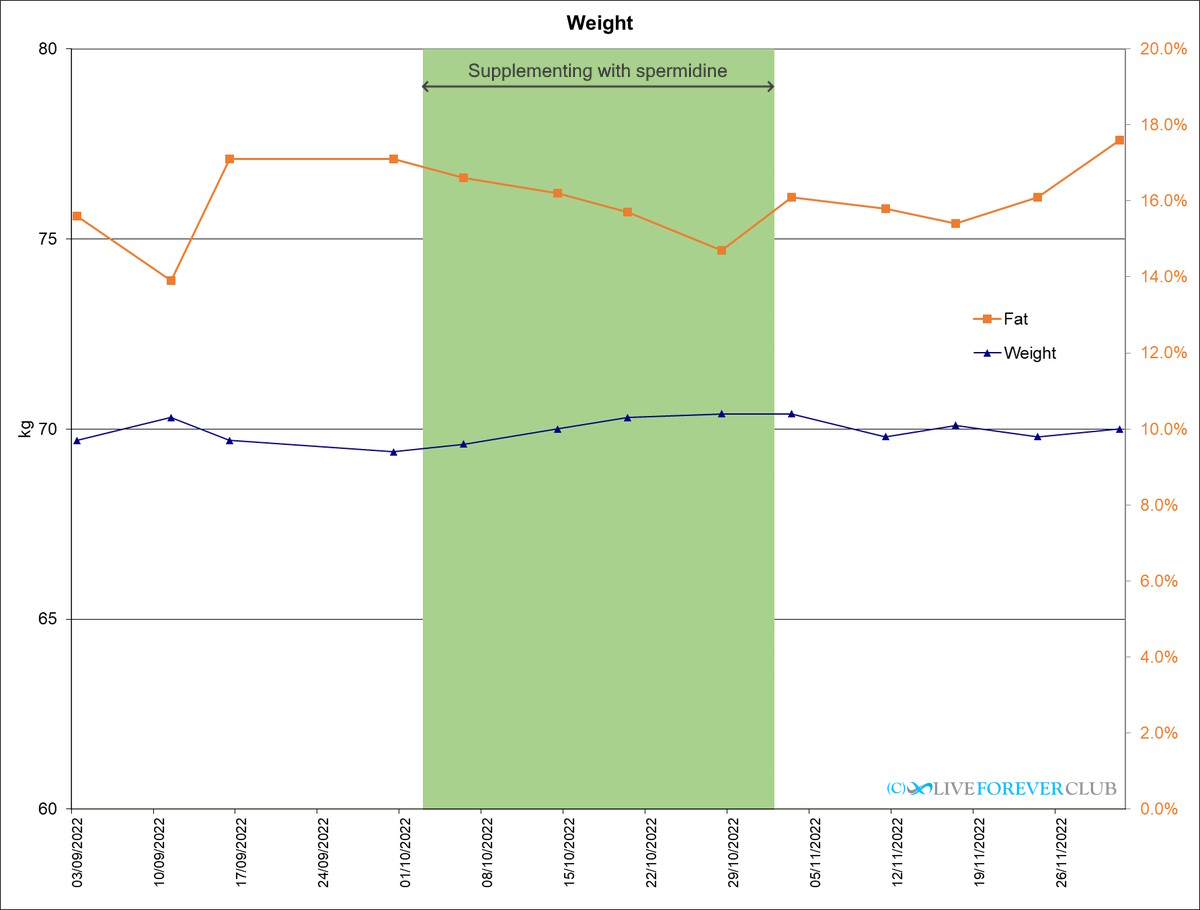
Finally, let’s look at how my fitness faired, based on my running pace. Typically I run twice a week, a 3 miler midweek and 8 miles at the weekend, so these are be tracked separately. However, there aren’t as many data points for the 8 mile run as I was doing more miles on alternate weeks in preparation for a half marathon.
Remember when looking at the graph below, it is showing minutes-per-mile, i.e. how long it takes me to run a mile, which means the higher the number the slower I’m going. Unfortunately, looking at these lines, there appears to be a slight upward trend, meaning my pace went down a little. However, of all the physical biomarkers, this one varies the most and is more liable to external effects such as weather and route, so I might put this on as neutral within the margin of error.
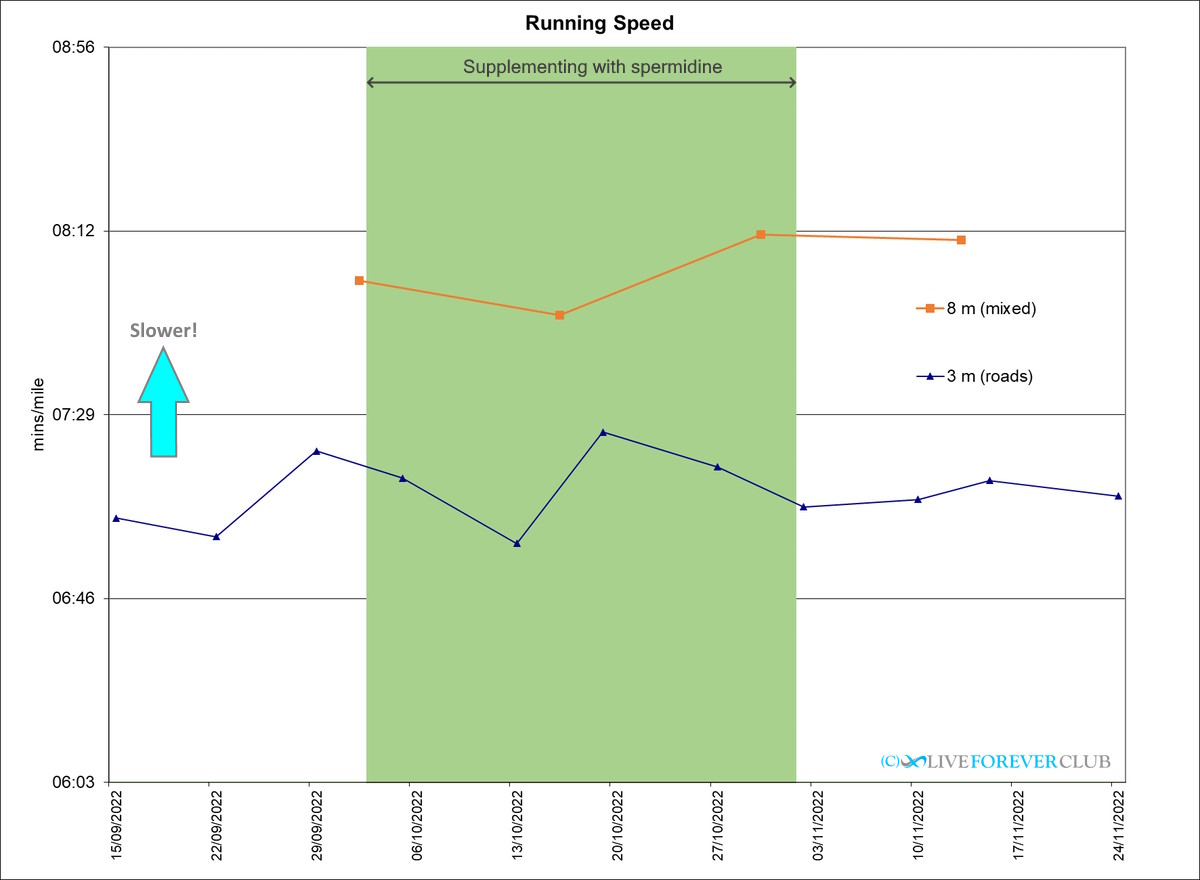
Also sports-related, I often get cramp in my feet and calves at night, especially after running, and that seemed to ease a bit. Though, writing this up 4 months later, I’m rarely getting cramp, so is either a long-term effect of spermidine, or possibly more likely, that I am taking more care with my ankles by wearing compression socks most of the time. The problem with an n-of-1 trial!
In conclusion, the Primeadine spermidine supplement trial revealed some promising results, including a slight improvement in sleep quality, a small reduction in blood pressure, and a temporary increase in SpO2 levels. While weight remained stable, body fat percentage showed a reduction during the trial. However, no significant changes were observed in running pace.
Although this trial was limited in scope and lacked a comprehensive evaluation of all potential benefits, the improvements in certain health biomarkers suggest that spermidine supplementation could be worth exploring for those interested in enhancing their overall well-being. As with any supplement, it is essential to consult with a healthcare professional before making any significant changes to your regimen and to monitor your health closely during the process.
It will be great when there are consumer tests to measure autophagy (or cellular level generally) directly, to see how that is affected, but given my fat percentage and SpO2 improvements, I look forward to trying Primeadine again.
P.S. Oxford Healthspan has offered a discount on Primeadine to club members since 2020 - get the discount code here
Click on resource name for more details.
Club discount available - click here
Premium spermidine supplement - aging wisdom from Japan
Antioxidants in ageing and health
Jinfiniti NMN Supplements Personal Case Study
What consumer tests are available to check your hallmarks of ageing and how they're impacting your body?
A good jump in NAD levels and grip strength during this one month trial, but not everything improved
History and mechanisms of this calorie restriction mimic that promotes autophagy
2 month trial of nicotinamide riboside NAD booster Tru Niagen